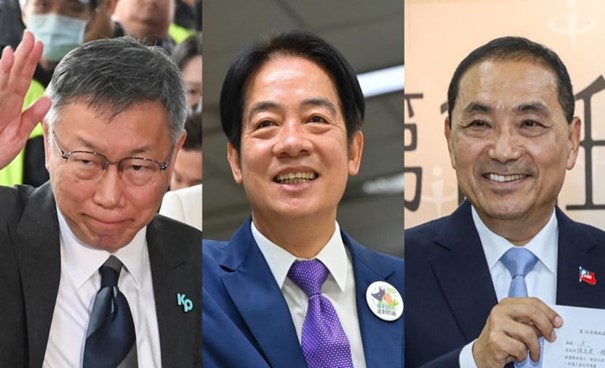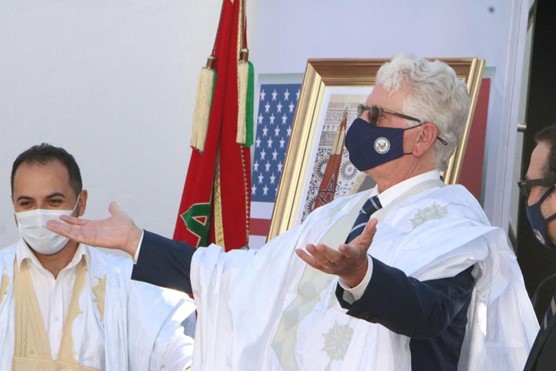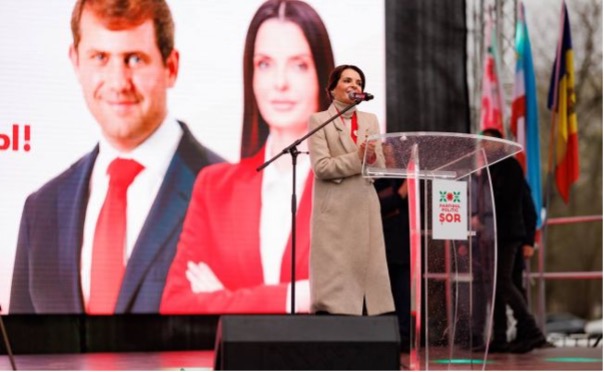Presidential Elections in Northern Cyprus: The Same Old Candidates, the Same Old Issues and Solutions on Offer
On October 11, eleven men will face off in the presidential election of the Turkish Republic of Northern Cyprus (TRNC). This will be the 10th presidential election for the Turkish Cypriots since 1974, when military coup d’etat combined with communal strife led to a Turkish intervention and subsequent occupation of the northern part of Cyprus, laying the groundwork for decades-long split of the island, and the creation of the unrecognised TRNC. Since then, countless negotiation rounds have been held in attempts to reunify the island, most recently in 2017. The United Nations has tried to restart the negotiations since 2019, but there is general agreement that the next round of negotiations will start only after the elections, which were, however, delayed due to Covid-19 (originally scheduled for April 26). Whereas the president heads the TRNC delegation in the peace talks with the Republic of Cyprus (ROC), then candidates’ roadmaps for solving the Cyprus issue are considered decisive for election results. The election itself is expected to serve as an unofficial referendum on the type of solution that Turkish Cypriots support.
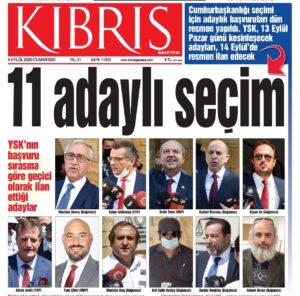
Image: Eleven men vying for the position of TRNC’s president. Lack of female candidates did draw some attention on social media (Source: Twitter).
Three approaches to conflict settlement
There are three general options for peace talks and conflict settlement: to reunify with the South in a federal state, to form a looser alliance (e.g. a confederation), or to create two separate states. Below, the positions of six main candidates are mapped, as the remaining five candidates – all minority or independent candidates – have not gained a lot of support and hence media attention.
In principle, the basis for the reunification of the island – the creation of a bi-zonal, bi-communal federation – was agreed upon already in 1977, and this approach is also supported by the international community. But the devil is in the details: as the representatives of both sides have different understandings of what the federal model should actually entail, it has never come to fruition. Nevertheless, this “classical” model for resolving the Cyprus issue is favoured by left-wing politicians, like the incumbent president Mustafa Akıncı (independent candidate), who sees this bi-zonal, bi-communal federation as comprising of two societies and two regions, which are based on political equality, joint decision-making and a rotating presidency. Another candidate favouring a federal solution is Tufan Erhürman (Republican Turkish Party), former prime minister and current leader of the largest opposition party, although unlike Akıncı he also believes that if Greek Cypriots are not ready for a settlement, then TRNC should move forward on their own, instead of waiting around for further talks.
Considering the lack of success of the federal model, some candidates, however, argue that there should be no preconditions for governance models in the next round of negotiations, and alternative models should not be discounted. This is the position of the current prime minister Ersin Tatar (National Unity Party), as well as that of Kudret Özersay (independent candidate), who just resigned from the position of minister of foreign affairs/deputy prime minister. The latter specifically has emphasised the need for greater flexibility in discussing possible cooperation models, and has tried to avoid endorsing any specific solution or discounting the federal solution completely. Third candidate to advocate for seeking alternative options is Serdar Denktaş (independent candidate), although in a presidential candidates’ debate on October 6, he also appeared to be more supportive of a federal solution.
Finally, some candidates – more on the right-wing spectrum – are publicly advocating for dropping the federal model in favour of a clear two-state solution. While Tatar has emphasised the need to look at different options, his preferred model would be a two-state solution, although he does see both of the states as being part of the EU. Clearly in favour of a two-state solution is Erhan Arıklı (Rebirth Party), who promises to focus on gaining international recognition for TNRC. And even though Özersay has supported flexibility, he also believes that a two-state solution might be the most realistic outcome in the end.
Under the Turkish shadow
Relations with patron state Turkey are also under scrutiny, considered to be the second key topic during these elections, and a major focus during the candidates’ debate on October 6th. Such explicit focus on Turkish-TRNC relations is somewhat unprecedented: while it is clear that different solutions of the Cyprus conflict would give Turkey different levels of control over the TRNC, candidates used to signal their positions towards Turkey more covertly – supporting a federal solution would ostensibly lessen TRNC’s dependence on Turkey through integration with the ROC and the EU, while a two-state solution would increase that dependence. This time, relations with Turkey are openly front and centre, as the local population is increasingly torn between feeling angered by Turkey’s direct interference on the island, and believing that good ties with Turkey are essential for their country’s survival, both militarily and economically.
Considering that Turkey also holds a seat at the negotiation table as one of the three guarantor powers (along with Greece and the UK) of the Republic of Cyprus, it is notable that they are now explicitly advocating for a two-state solution, which would solidify Turkish influence on TRNC and strengthen their claim on the gas reserves off the Cyprus coast, but is obviously in contradiction with the “Cypriot owned, Cypriot led” approach adopted during the last negotiations. And while Tatar, the preferred candidate of Turkey, does promise to strengthen TRNC-Turkey relations upon victory, incumbent Akıncı has adopted a far more critical stance towards Turkey’s meddling both in TRNC as well as in the wider region ever since he won the presidency in 2015, starting a Twitter spat with Erdogan the day after winning the elections over the role of TRNC in the relationship with Turkey. During this election cycle, Akıncı has publicly accused Turkey of trying to interfere in the vote – which the latter party has denied –, and has been critical of Turkey’s expansionist foreign policy. There might be some merit to these concerns, as right-wing parties (National Unity Party, Democratic Party and Rebirth Party) have reportedly had a series of meetings with Turkish government officials in Ankara to discuss getting behind a joint candidate. Reports have also emerged from TRNC’s local community leaders of soliciting votes for the right-wing candidates in exchange for promises to help solve local problems. While left-wing Erhürman has been rather vague in his stance towards Turkey, Ankara would still prefer him to Akıncı. Interestingly, many Turkish Cypriots also consider Özersay to be Ankara’s chosen one, as his long-term participation in the Cyprus peace talks and his current position as minister of foreign affairs has led to him developing close ties with many Turkish state officials.
To vote or not – that seems to be the question
It is highly likely that the Sunday vote will not be able to produce a winner. TRNC uses a two-round voting system: if no candidate receives more than 50% of the votes in the first round, the winner will be decided between the top two candidates in the second round, which would usually be held a week after the first round. Voting will be influenced by several factors. Firstly, experts are worried that the coronavirus pandemic and the disillusionment with finding a solution for the Cyprus conflict might suppress overall voter turnout, yet hope it would still be around 60%, as it was during the last elections. A survey by Prologue Consulting showed that 53% of respondents declined to reveal which candidate they would support: 15.8% out of the 53% stated that they would not be voting at all, while 14.6% were undecided and 22.6% refused to answer political questions. On the other hand, the government’s handling of the pandemic – which seems to be poor according to social media – might actually drive people to vote, and might cost votes for the two candidates currently in the government, namely Tatar and Özersay, although Özersay’s surprise resignation just days before the election might boost his support among protest voters.
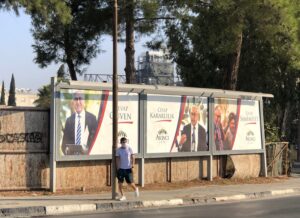
Image: Coronavirus is feared to affect voter turnout for Sunday’s presidential election (Source: CyprusMail).
As stated above, voting will allow Turkish Cypriots to show their positions regarding what should be solution for the Cyprus conflict, and how close should TRNC be with Turkey. As Turkey is backing Tatar, there are three main options: rallying around Akıncı and re-electing him, supporting Tatar, or trying to balance Turkish influence with a midway approach by choosing Erhürman over Tatar. These three candidates have consistently had the strongest support in various polls, with Arıklı, Özersay and Denktaş trailing far behind. Pro-unification voters would be expected to back Akıncı or Erhürman, yet it is also important to note that while the latter was prime minister, he carefully avoided referring to any solution in fear of upsetting Turkey, nor did he cross to the south during his tenure as the head of administration, indicating that he might be quite accommodating to Turkey’s interests in the end.
A poll conducted by Turkish Cypriot daily Kibris Postasi at the end of September showed Tatar in the lead with 25.9%, with Akıncı barely squeezing by Erhürman for the second position. Gezici Research Company’s latest poll also shows Tatar and Akıncı advancing to the second round, where Tatar would beat Akıncı 54.1% to 45.9%. Political analysts predict that Akıncı will be able to advance to the second round, but whether the run-off would be between him and Tatar or Erhürman, is more difficult to say. If Tatar advances to the second round, Akıncı does have a chance, as Tatar might still fall victim to internal tensions within his own National Unity Party: should he win presidency, he would be able to maintain a strong influence over the party, whereas his loss would essentially signal the end of his political career. His position within the party, and in public, might be further influenced by the collapse of the governing coalition just days before the presidential election, as the resignation of foreign minister Kudret Özersay over the prime minister’s decision to unilaterally reopen the Varosha/Maraş resort town has deprived the coalition from majority. However, should Erhürman advance to the second round, he has good chances to beat Akıncı, as he would then be more preferable to both Turkey, as well as to other Cypriot parties.
Aftermath
Whatever the actual result of the election will be, there is actually little hope of significant change. Whoever wins the presidency of TRNC will continue to cooperate with Turkey. The win of pro-unification Akıncı or Erhürman might mean that peace talks will resume rather sooner than later, yet as shown by the last decades, this might still not lead to a breakthrough in actually establishing a federal state in Cyprus. And if pro-independence Tatar wins, he will still participate in peace talks, although his decision will be more likely dependent on Turkey’s stance and willingness to join the talks. In the end, Turkey continues to hold the strongest hand in solving the Cyprus issue, and their own regional interests, both political and economic, do not favour resolving the conflict in the near future.
Author: Kristel Vits


